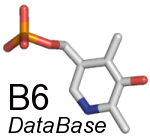|
|
| type |
Journal Article |
| authors |
Han L, Yuan J, Ao X, Lin S, Han X, Ye H |
| title |
Biochemical Characterization and Phylogenetic Analysis of the Virulence Factor Lysine Decarboxylase From Vibrio vulnificus |
| journal |
Front Microbiol |
| Activity |
4.1.1.18 |
| Family |
4.1.1.18.b |
| sel |
selected |
| ui |
30619163 |
| year |
(2018) |
| volume |
9 |
| pages |
3082 |
| | |
|---|
| keywords |
Vibrio vulnificus; biochemical characterization; lysine decarboxylase; phylogenetic analysis; virulence factor |
| abstract |
Cadaverine is produced in organisms from the amino acid lysine in a decarboxylation reaction catalyzed by lysine decarboxylase (EC 4.1.1.18). The inducible lysine decarboxylase CadA plays a vital role in acid stress response for enteric bacteria. Vibrio vulnificus is an extremely virulent human pathogen causing gastroenteritis when the acid conditions that prevent survival of V. vulnificus in the stomach or small intestine are overcome. A gene encoding CadA was identified from V. vulnificus. Subsequent analyses showed that CadA from V. vulnificus (VvCadA) is a decamer with a 82-kDa subunit. Homogenous VvCadA was purified from Escherichia coli and used for lysine decarboxylation with an optimal pH of 6.0 and optimal temperature of 37°C. The apparent V max and K m for lysine were 9.45 ± 0.24 μM/min and 0.45 ± 0.05 mM, respectively. Mutation analysis suggested that the amino-acid-binding pyridoxal phosphate, the cofactor of the enzyme, plays a vital role in the reaction. Mutation of the negatively charged residues interacting with lysine also affected the activity of the enzyme to some extent. Quantitative RT-PCR showed that expression of VvcadA was up-regulated under low pH, low salinity, and oxidative stresses. Furthermore, the concentration of cadaverine released to the cell exterior also increased under these stresses. Protein sequence similarity network (SSN) analysis indicated that lysine decarboxylases with ornithine decarboxylases and arginine decarboxylases shared a common ancestor, and that lysine decarboxylases are more conserved during evolution. Our data provide evidence for the biochemical characteristics and important roles of VvCadA under stress conditions. |
| last changed |
2019/01/15 09:12 |
|











